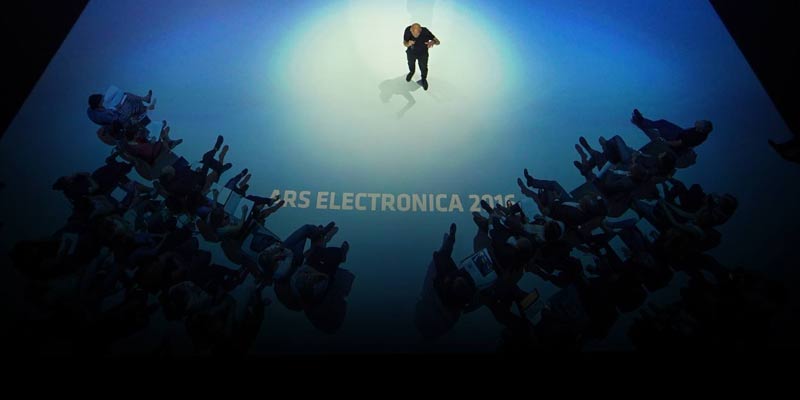Ars Electronica 2013
Festival for Art, Technology and Society
Linz, September 5-9
(Linz, March 20, 2013) This year’s Ars Electronica Festival is set for September 5-9 in Linz. The title is TOTAL RECALL – The Evolution of Memory. The festival program will consist, as always, of a splendid array of symposia, exhibitions, performances, interventions and concerts; the details will be announced online at ars.electronica.art/totalrecall over the coming weeks. We will also be publishing in-depth information about participating artists and scientists, and interviews with them at ars.electronica.art/aeblog.
TOTAL RECALL – The Evolution of Memory
Since time immemorial, each successive generation has no doubt pondered how and what the next generation will think about them after they’re gone some day. But what factors ultimately determine what and how we remember? What role does remembrance in general play for each of us as individuals, for our families, our society, indeed for all of humankind? And for that matter—what actually is memory? This year’s Ars Electronica will bring together neuroscientists and computer engineers, artists and philosophers for an in-depth consideration of TOTAL RECALL and an endeavor to elaborate on how we human beings deal with storing our memories, preserving them, and also, at times, trying to forget. In going about this, the focus will be on three key aspects: (neuro)scientific findings and insights about what memory actually is and what meaning it possesses for our consciousness and our identity; the various cultures of remembrance and the diverse storage media used in the past and the present; and future forms and methods of conserving memory.
What Is Memory?
For a long time, scientists have been conducting research on why we are even capable of remembering things. At this year’s symposium, experts will explain how memory originates in our brain and how it’s stored here and later recalled. Plus, they’ll go into the social and cultural role of these very same neurosciences that, in light of the tremendous influence they now exert on how we view humankind, have long since taken over the lead position among all scientific disciplines.
Cultures of Memory and Technology
Knowing who and what came before us is of central importance to our consciousness and our individual as well as collective identity for every one of us, regardless of how and where we live. The tremendous efforts that we invest in endeavors to trace our past as well as the work we are prepared to put into securing and preserving our own legacy attest to this. To do so, we deploy the most advanced technology we have at our disposal, whereby we incessantly exhaust ever more data storage capacity and thus generate a massive increase in the quantity of data to be conserved. A good, timely example is provided by the internet: although only about 30% of humankind is online, we have the feeling we’re already totally overwhelmed by the deluge of information we generate and save to memory on a daily basis. In order to nevertheless find our needle in this gigantic haystack, we rely on ever more intelligent search engines, though our dealings with such services bring interests into play that are quite different from ours or even utterly in conflict with them. After all, Google & Co. deliver access to information only as long as there’s revenue to be earned by doing so. And if censorship has to be accepted as part of the bargain here, well that’s just too bad for the end user.
Memory in the Future
And finally, it’s incumbent upon us to face the question of how we’ll be dealing with remembering and memory in the future. The first successful attempts to use human DNA as a virtually unlimited data storage medium make it evident that we’ll soon be proceeding on completely new tracks. And what about what happens when we actually do succeed in recreating nature’s perfect receptacle of memory and create an artificial equivalent, an artificial intelligence?
About the Ars Electronica Festival
Since 1979, the Ars Electronica Festival has been coming to grips with reciprocities at the interface of art, technology and society. Symposia, exhibitions, performances, interventions and concerts variously elaborate on a specific theme chosen each year on the basis of its importance and timeliness. Another signature element of this conclave is the consistent effort to put on events in extraordinary, unconventional settings. Linz’s Danube harbor infrastructure, tunnels cut into the city’s rocky hills, monasteries and cathedrals, factories and mills, and a downtown parking deck are a few of the venues at which Ars Electronica has staged its annual discourse amidst the public sphere. The jam-packed festival line-up features hundreds of artists, scientists and high-tech insiders from all over the world. It’s produced by Ars Electronica, a wholly-owned subsidiary of the City of Linz, and co-produced by the ORF – Austrian Broadcasting Company’s Upper Austria Regional Studio, the Brucknerhaus concert hall and the OK Center for Contemporary Art.
press release “Ars Electronica Festival 2013: TOTAL RECALL – The Evolution of Memory” / PDF
Curatorial Statement from Christine Schoepf and Gerfried Stocker (Board of Directors Ars Electronica) / PDF
Why not visit our Ars Electronica Blog, where new posts on the Ars Electronica Festival will be added frequently.
Media representatives are invited to request an accreditation for the Ars Electronica Festival 2013 here.
http://www.flickr.com/photos/arselectronica/8570376591/
Logo Ars Electronica Festival / Nicolas Naveau / Printversion / Sammlung

